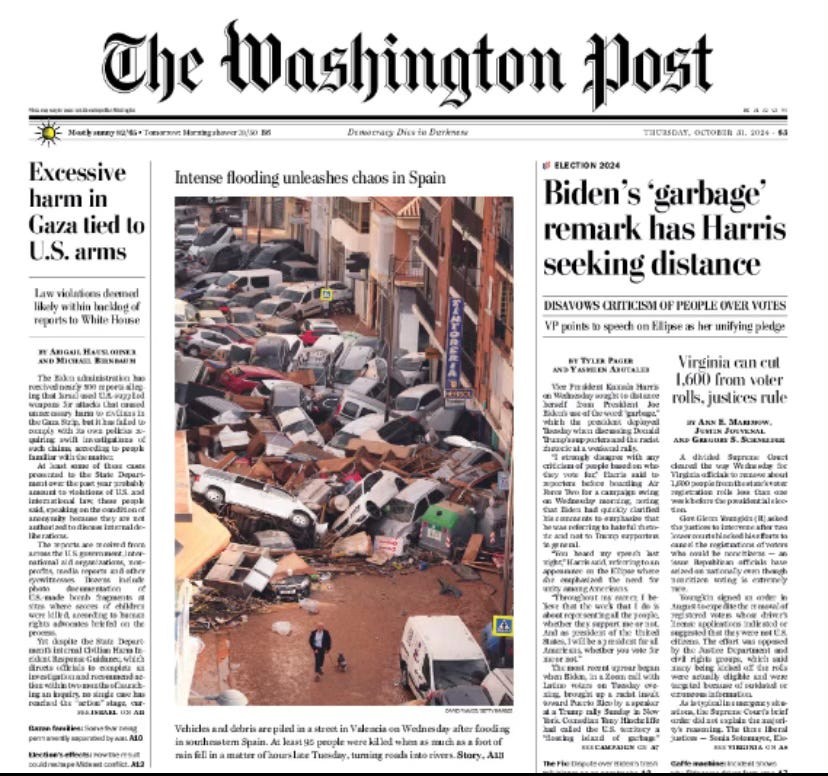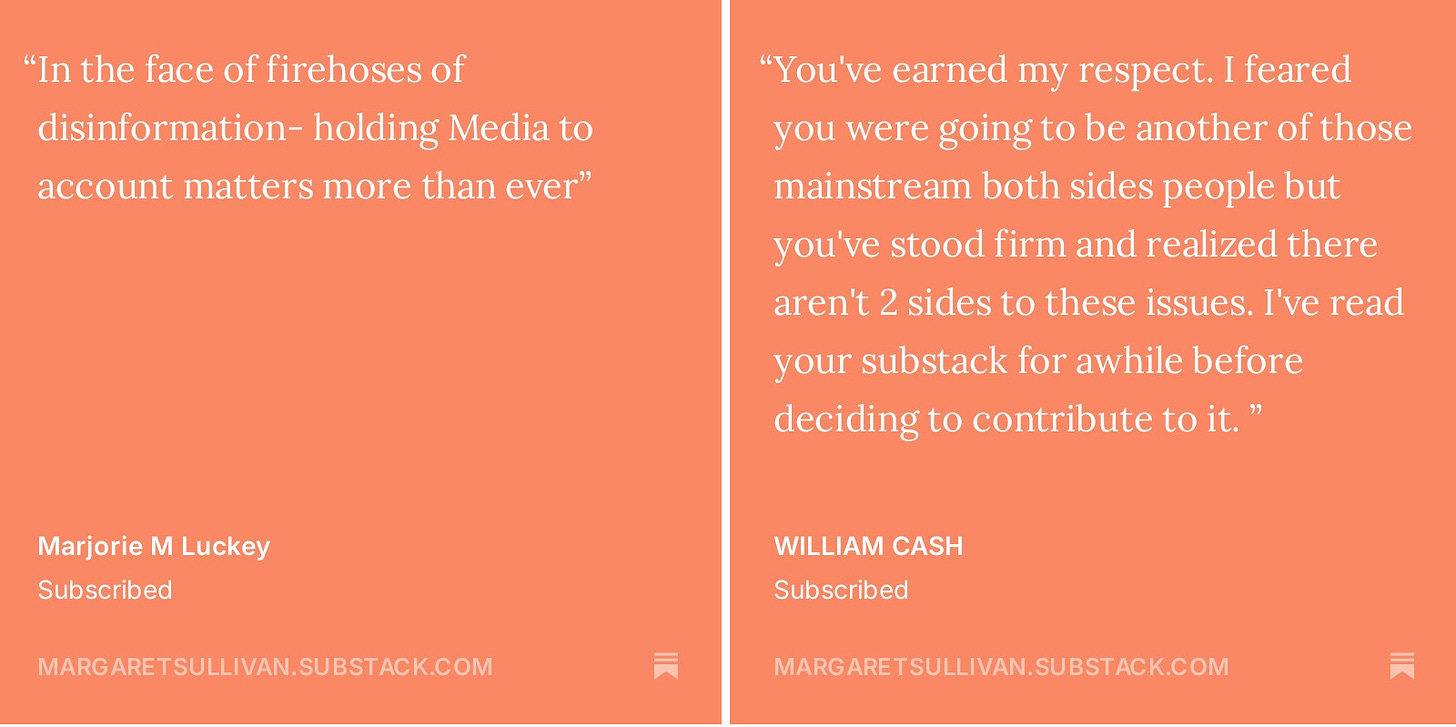A media critic urged ‘not the odds, but the stakes.’ Did it work?
My interview with Jay Rosen, who coined the phrase urging less 'horse race' and more consequences
A few weeks ago, I dedicated this newsletter, for the duration of the presidential campaign, to a concept for media coverage embodied in six words: ‘Not the odds, but the stakes.”
The author of that elegant phrase is preeminent press critic and NYU professor Jay Rosen, who is also a friend of mine and, like me, a Buffalo native. Jay has a knack for such things; he also popularized the media criticism known as “the view from nowhere,” and the better idea of a “citizen’s agenda” for coverage.
“Not the odds, but the stakes” resonated, especially after Oliver Darcy, then of CNN, wrote about it in late 2023. Soon after, it began to be quoted and discussed more widely. Non-journalists found it important — they very much wanted their news sources to make this switch.
Media people were certainly aware of the expression, and in recent weeks, many news outlets organized their coverage under tags called, for example, The Stakes. (They didn’t credit Rosen, but I think it influenced them nonetheless.) The Guardian was one of these and I wrote a “stakes” piece about how press rights would suffer in a second Trump term.
A couple of days ago, I talked with Rosen about how he thinks it all played out. The short answer? It made a difference but didn’t fundamentally change politics coverage, which for the most part continued down its frustratingly flawed path — the addiction to polls, pundits and “neck and neck” predictions.
Rosen is modest, and I believe he made more difference than he admits, but at any rate, here’s what he had to say.
“It might have made a difference in reminding journalists of something they already know,” Rosen told me. “But in changing the dynamic of campaign coverage, I don’t think it had an effect.”
There could have something other than the horse race to use as an organizing principle for campaign coverage, he said. For example, the possible loss of democracy could have been such a centerpiece.
“But the horse race is too easy, too available — it has all these advantages,” he said.
How does this play out? This is my example, not Jay’s, but consider how the New York Times and the Washington Post, along with others in national media, gave such huge emphasis last week to the story about Biden’s verbal gaffe in which he used the word “garbage.” (He says he was describing the demonization of Puerto Rican people that was depicted at Trump’s appalling Madison Square Garden rally; others — especially on the right — heard Biden’s words as a description of Trump’s followers.)
If coverage is based around the horse race, this is a big story because it remind people of how Hillary Clinton’s 2016 campaign was damaged after she described some Trump fans as a “basket of deplorables.” And indeed, that’s how they played it — both major newspapers led their home pages with that story, framing it as how Kamala Harris was being forced to distance herself from Biden and how it was giving “grist” to her opponents. Both papers also put the story above the fold on their Thursday front pages.

Huge, in other words. As Greg Sargent of the New Republic put it in a smart X thread: “The news hook is literally that it provided ‘grist’ to Republicans,” and this in effect “outsources the judgment about the newsworthiness of the event to bad-faith actors.” He’s right. It’s also classic false equivalence — as Trump devolves into simulating oral sex with a microphone, there must be something bad to say about Harris’s campaign, right?
If media coverage had been centered around the potential loss of American democracy, or really, anything other than horse race coverage, this Biden screwup wouldn’t have mattered much. Biden’s not the candidate, after all. There’s no actual consequence to this story.
But if your organizing principle is the horse race — neck and neck going into the home stretch! — Harris’s response is a much bigger deal. So the emphasis tells us a lot.
Rosen muses on what politics reporters are trying to accomplish. And he answers his own question: The overall aim “seems to be about getting scoops and excelling at campaign coverage.” It does not seem to be about the main role of the press in democracy — to fairly and accurately give citizens the information they need to vote and hold their public officials accountable.
But I do think that Rosen’s memorable phrase has made a difference. And I’m grateful to him for that and for much more. I’m also appreciative of of many others, including Daniel Dale, the excellent fact-checker at CNN; Timothy Snyder, the Yale historian; Ruth Ben-Ghiat who writes here on Substack; Oliver Darcy, for his stalwart orientation for democracy, now in his media newsletter, Status; Eugene Robinson at the Washington Post; Judd Legum, who writes here, too; and Jelani Cobb of the New Yorker.
A couple of weeks ago, I observed to a friend who works in Big Media that I thought the New York Times had reformed its coverage somewhat — including a new section in which previous stakes-related coverage had been compiled, as well as a strong endorsement of Harris and some effective special sections, both on the news side and the opinion pages.
“Has the Times finally gotten religion?” I asked.
The half-joking response: “Deathbed conversion.”
Readers and subscribers, I’m very grateful for your support and attention. I’ll continue to monitor the media, and to do what you’ve continuously expressed appreciation of.
Be assured: No matter what happens on Tuesday, this newsletter isn’t going away, because our crisis of democracy is deeper than one election.
Some new subscribers have offered messages that they said could be shared publicly. I’m publishing two of them below to let you know that I’ve heard you and have taken heed. At a discouraging time, your involvement — expressed in comments and on social media — has meant a lot to me. Thank you all.
Please tell me your thoughts on last-minute media coverage as we approach Election Day. And, while I doubt that I need to urge you to vote, I do urge you to make sure you get your friends and family out there, too.
The stakes are exceedingly high.







It's impossible for me to comment on media coverage because I dropped the Times and WaPo some months ago and get my news now from The Guardian,the Philadelphia Inquirer, and various Substack writers, all of whom figured it out from the beginning. Your column today is a great way to go into the official Election Day along with Heather Richardson's elegant reminder of the Stakes.
My question: When did news organizations decide it was their duty to conduct incessant polls telling us what *might* happen on Election Day? Why can’t they wait until Election Day? I fail to see how polls, which have proven extremely fallible, contribute in any meaningful way to the sum total of knowledge voters need to make up their minds.